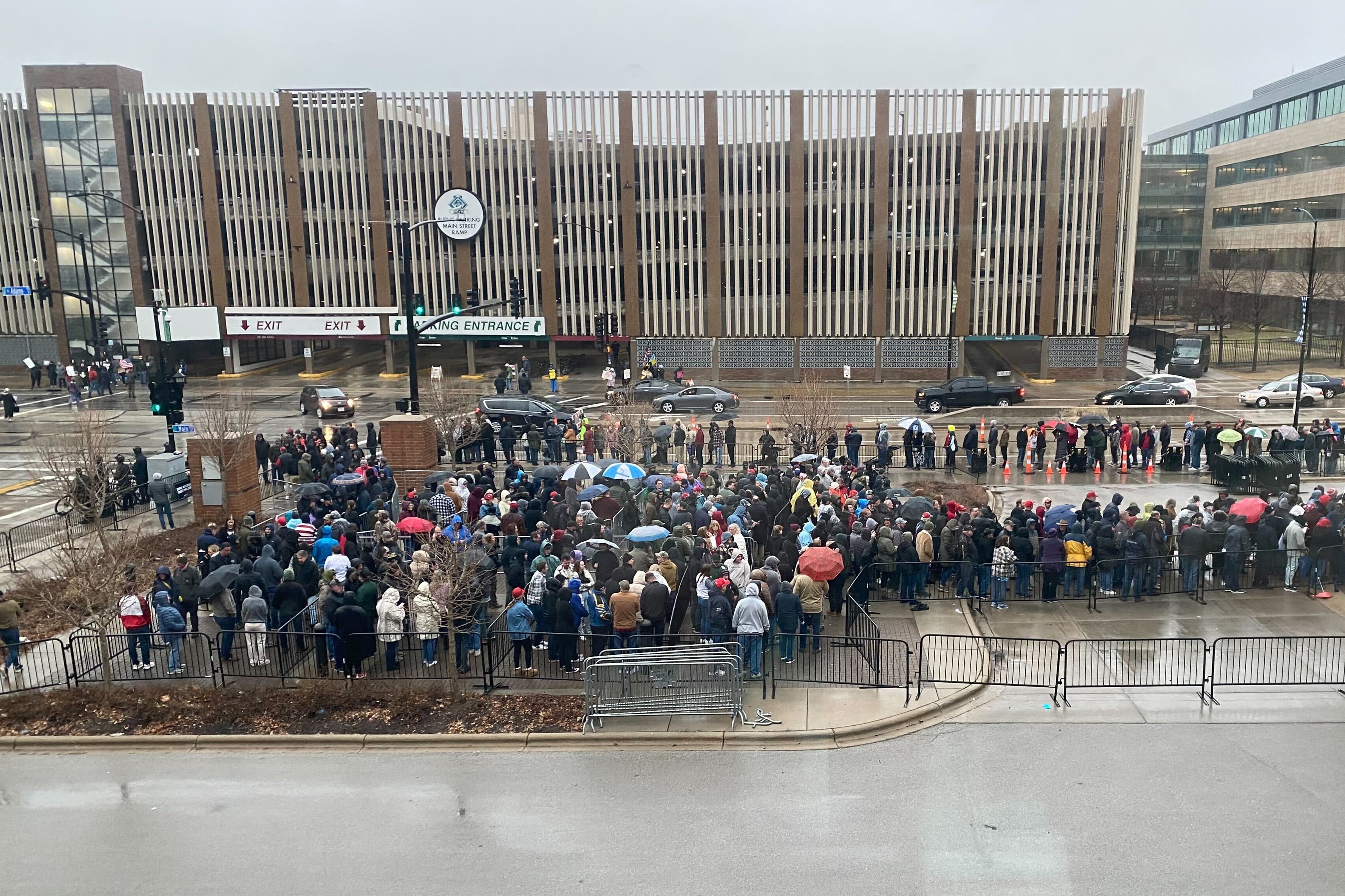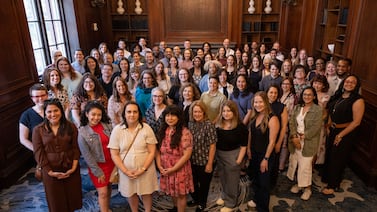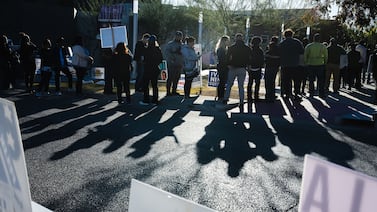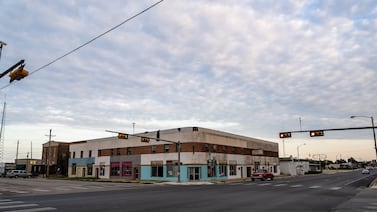Votebeat is a nonprofit news organization reporting on voting access and election administration across the U.S. Sign up for Votebeat Wisconsin’s free newsletter here.
GREEN BAY — At a Sunday event on the eve of the Wisconsin Supreme Court election, billionaire tech CEO Elon Musk spoke before registered voters, unapologetic about his controversial offer to pay two of them $1 million to promote his campaign against activist judges.
“It’s really just to get attention,” Musk said after handing the first check to Wisconsin voter Nicholas Jacobs, on a stage between two televisions urging attendees to vote for conservative Wisconsin Supreme Court candidate Brad Schimel. “We need to get attention.”
Shortly after, Musk handed the second check to voter Ekaterina Diestler.
Wearing a cheesehead hat, which he tossed into the crowd, he faced a packed convention center — many hoping to snag one of the two promised million-dollar prizes. Saying online betting odds on the race have been against Schimel, Musk said “We’ve gotta pull a rabbit out of the hat, next level,” adding, “We need to generate an anomaly in the matrix.”
Outside of the convention center, hundreds of protesters gathered, criticizing Musk and his influence on the government.
The giveaway was an unprecedented tactic in Wisconsin state elections — one that could change how future campaigns are conducted, and test the limits of how far wealthy funders can go.
Some attendees told Votebeat that they were only here to see Musk, not for the $1 million. One voter, from nearby Casco, said she didn’t know about the $1 million giveaway and was here just to see Musk, whose SpaceX company evokes her love for the “Star Wars” franchise.
Many of those who were aware of the giveaway said they didn’t think they had a realistic shot to get the money. But ahead of the event, in one area of the convention center, a crowd of men imitated Dr. Evil from the “Austin Powers” movies, intoning, eventually in unison, “One million dollars.”
For the 48 hours leading up to the event, Democrats scrambled unsuccessfully to stop it. Musk — the top spender in what is now reportedly the country’s most expensive judicial race and a supporter of conservative candidate Brad Schimel — initially said in a social media post that the event would only be open to those who had voted in the Wisconsin Supreme Court election, and he would hand out two $1 million checks to “in appreciation for you taking the time to vote.”
Musk then deleted the post on X, the site he owns, as legal experts pointed out that the handouts would constitute a likely violation of the state’s election bribery law. Wisconsin law prohibits any payments that would induce voters to vote, or refrain from voting.
Instead, Musk said the handouts would go only to registered voters who signed an online petition organized by his political action committee, America PAC. The petition — aimed at opposing “activist” judges — offers $100 to the registered voters who sign it. And the signup for the Green Bay event had a mandatory field asking hopeful winners of the $1 million how they plan to vote. Though the form doesn’t specifically mention the Wisconsin Supreme Court election, the possible answers are “already voted,” “early vote,” “absentee ballot,” and “vote on election day.”
On Friday, Attorney General Josh Kaul, a Democrat, sued to stop Musk, arguing that even the revised plan still amounted to offering illegal incentives “to induce people to vote.” On social media, Democrats rallied around the talking point that Wisconsin votes are not for sale, criticizing Musk as polls showed most state residents disliked him. Meanwhile, Schimel put distance between his campaign and Musk, saying he had no knowledge of the rally and had no intention of attending.
Despite the flurry of legal filings over the weekend — from the lower courts to the Wisconsin Supreme Court — no court stepped in to stop the event. In a filing with the Wisconsin Supreme Court, lawyers for Musk said that Kaul’s efforts were aimed at “restraining Musk’s political speech and curtailing his First Amendment rights.”
In the filing, the lawyers wrote that the $1 million payments are intended to “generate a grassroots movement in opposition to activist judges, not to expressly advocate for or against any candidate.” The brief notes, though, that some expenses associated with America PAC’s Sunday night event in Green Bay are being reported as independent expenditures in support of Schimel’s candidacy.
Musk’s filing sought the recusal of two Supreme Court justices, Jill Karofsky and Rebecca Dallet, who support the candidacy of Dane County Circuit Court Judge Susan Crawford, the liberal high court candidate.
Minutes before the event started on Sunday evening, the Wisconsin Supreme Court rejected Kaul’s request to take up the lawsuit or stop Musk from doing the giveaway.
So the event went on as planned, with scheduled speakers — Musk, U.S. Sen. Ron Johnson, a Republican, and U.S. Transportation Secretary Sean Duffy — rallying on behalf of the conservative Supreme Court candidate on a stage placed between two television screens that urged attendees to vote for Schimel on April 1, though speakers also touched on everything from crypto to government efficiency and Musk’s efforts to remake the federal government.
“This is all about getting out to vote on Tuesday to elect Brad Schimel, the next justice of the Wisconsin Supreme Court,” Johnson said.
Payments like Musk’s could become ‘new normal’
This isn’t the first time Musk has experimented with cash giveaways tied to civic participation. Ahead of the 2024 presidential election, he launched a petition in support of the U.S. Constitution, awarding one $1 million check a day to hand-selected people who signed it. A Pennsylvania court upheld the legality of Musk’s giveaways, which reportedly went to swing state voters in Wisconsin, Pennsylvania, Michigan, North Carolina and Georgia.
But this time, the tactic is tied to a state-level race. Earlier this week, Musk awarded another $1 million check to a Green Bay voter who signed the Wisconsin petition.
Jeff Mandell, the founder of the liberal firm Law Forward, which filed a brief in opposition to Musk’s latest effort, told Votebeat that the event was “the equivalent of giving out lottery tickets in exchange for voting.” He said the earlier Pennsylvania ruling may have emboldened Musk — but this case is different.
Mandell also took issue with the mandatory field on the sign-up form requiring potential attendees to state how they would vote.
If courts don’t get in the way to stop Musk’s event, Mandell said, such indirect payments to voters could “become, in some ways, like the new normal.”
Rob Yablon, a law professor at UW-Madison, said there are criminal laws that could also apply here, though he acknowledged prosecutors may be reluctant to bring charges, especially against voters.
It’s a felony to offer anything of value to induce anybody to vote, or refrain from voting, Yablon said, and it’s also a felony to receive money to vote or refrain from voting.
If voters accept $100 that’s contingent on being a registered voter, and the registration condition is meant to induce people to actually vote, he said, it’s plausible for a prosecutor to argue that voters are receiving the money in exchange for the expectation that they’ll vote.
“I don’t want to predict that there would be prosecution and that it would result in liability,” Yablon said. “But at the very least, for me, I would be very reluctant to want to sign this thing.”
A spokesperson for Kaul didn’t immediately respond to a request for comment on whether he’s planning criminal prosecutions.
Alexander Shur is a reporter for Votebeat based in Wisconsin. Contact Alexander at ashur@votebeat.org.




